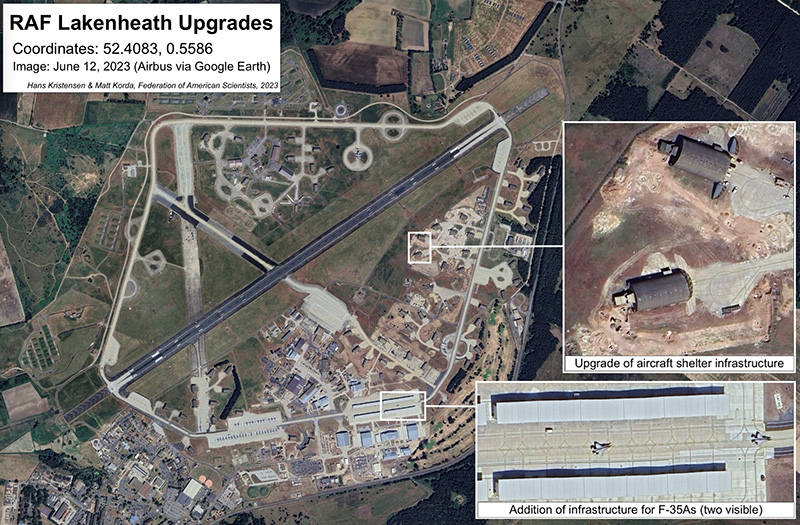
Significant modernization is underway at RAF Lakenheath for F-35A aircraft, a planned “surety dormitory,” and other infrastructure indicating that the nuclear weapons mission may be returning after a hiatus of 15 years. New U.S. Air Force budgetary documents strongly imply that the United States Air Force is in the process of re-establishing its nuclear weapons mission on UK soil, reveals Federation Of American Scientists (FAS) publications.
The Air Force’s FY 2024 budgetary justification package, dated March 2023, notes the planned construction of a “surety dormitory” at RAF Lakenheath, approximately 100 kilometers northeast of London. The “surety dormitory” was also briefly mentioned in the Department of Defense’s testimony to Congress in March 2023, but with no accompanying explanation. “Surety” is a term commonly used within the Department of Defense and Department of Energy to refer to the capability to keep nuclear weapons safe, secure, and under positive control.
The justification documents note the new requirement to “Construct a 144-bed dormitory to house the increase in enlisted personnel as the result of the potential Surety Mission”. To justify the new construction, the documents note, “With the influx of airmen due to the arrival of the potential Surety mission and the bed down of the two F-35 squadrons there is a significant deficiency in the amount of unaccompanied housing available for E4s and below at Royal Air Force Lakenheath”.
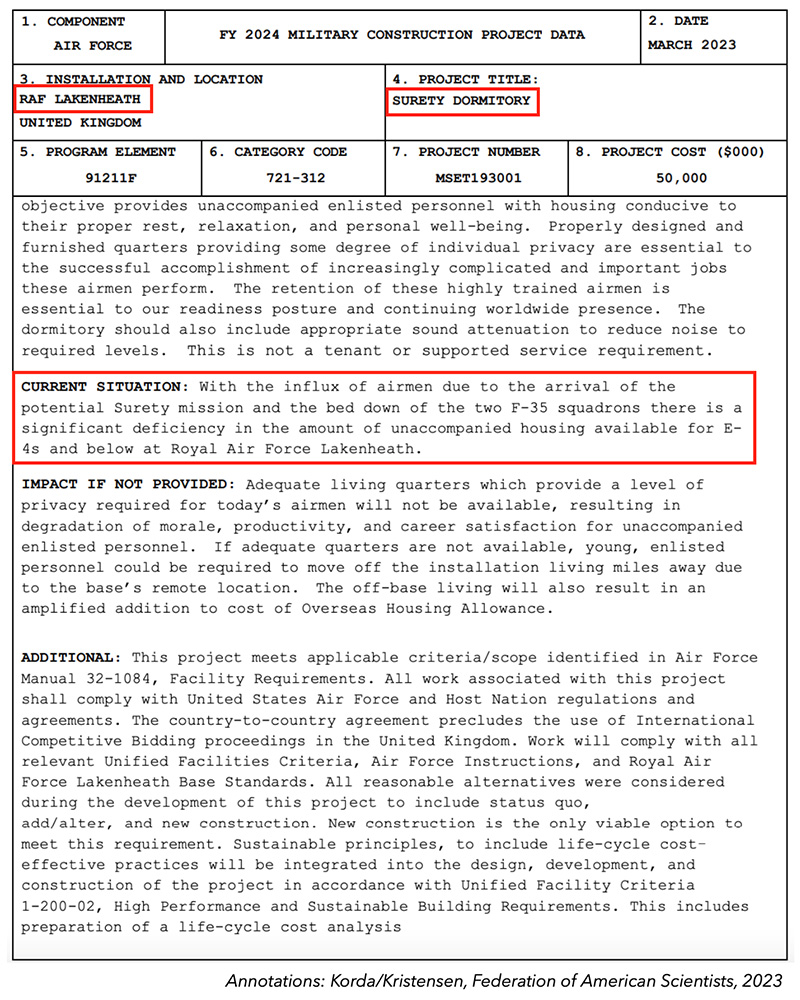
We previously documented the UK’s addition to the Department of Defense’s FY2023 budgetary documentary for the NATO Security Investment Program, in which it was written that “NATO is wrapping up a thirteen-year, $384 million infrastructure investment program at storage sites in Belgium, Germany, the Netherlands, the UK, and Turkey to upgrade security measures, communication systems, and facilities”. An explicit mention of the UK had not been included in the previous year’s budgetary documents, and it was removed in this year’s documents after we reported on its inclusion the previous year.
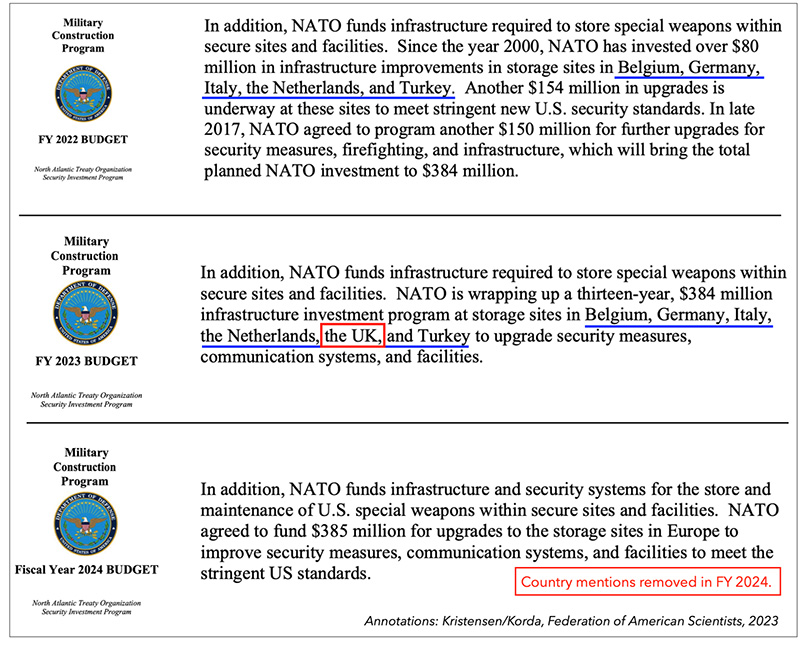
The removal of country names from the Pentagon’s latest list of nuclear base upgrades is yet another example of the United States reducing the nuclear transparency of its own nuclear posture while criticizing nuclear secrecy in other nuclear-armed countries.
The removal of country names from the Pentagon’s Military Construction Program budget request follows the denial of a recent FAS declassification request of previously available nuclear warhead numbers. These decisions contradict and undermine the Biden administration’s appeal for nuclear transparency in other nuclear-armed states.
The past two years of budgetary evidence strongly suggests that the United States is taking steps to re-establish its nuclear mission on UK soil. The United States has not stored nuclear weapons in the United Kingdom for the past 15 years, since we reported in 2008 that nuclear weapons had been withdrawn from RAF Lakenheath.
A total of 33 WS3 vaults were installed at RAF Lakenheath in the 1990s, each of which can hold up to four B61 bombs, for a maximum capacity of 132 warheads. Whenever nuclear weapons have been withdrawn from European air bases in the past, their vaults have been put into “caretaker” status, but as Harold Smith, the former U.S. Assistant Secretary of Defense for Nuclear, Chemical, and Biological Defense Programs stated at the time, these vaults were “mothballed in such a way that if we chose to go back into those bases we can do it.”
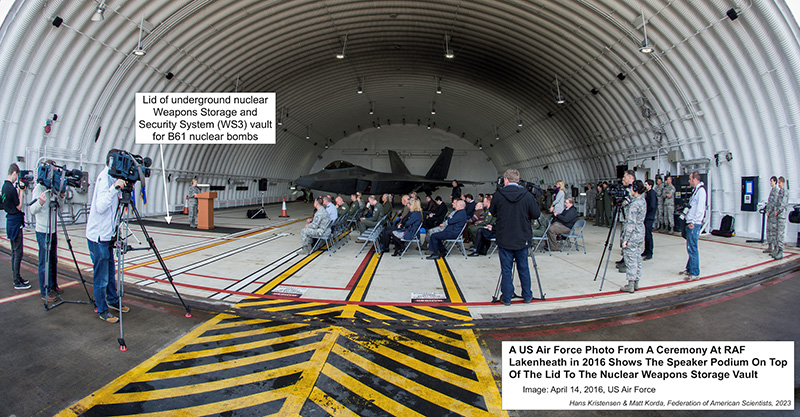
A total of 33 underground nuclear weapons storage vaults in aircraft shelters at RAF Lakenheath were mothballed, but documents indicate that they may be reactivated soon.
The nuclear-related upgrades to RAF Lakenheath are taking place as the new 495th Fighter Squadron (hosted at RAF Lakenheath) prepares to become the first U.S. Air Force squadron in Europe to be equipped with the nuclear-capable F-35A Lightning II. The upgrades coincide with the long-planned delivery of the new B61-12 gravity bombs to Europe, which will replace the approximately 100 legacy B61-3s and -4s currently estimated to be deployed in Europe.
And at the same time, they in NATO “do not understand” - why is Russia going to deploy its nuclear forces in Belarus …
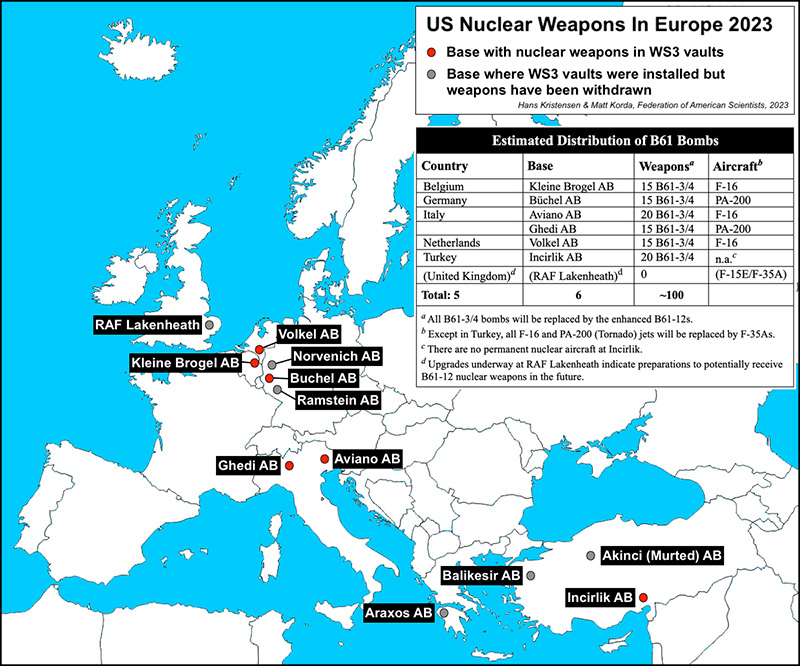
There are an estimated 100 B61 nuclear bombs deployed at six bases in five European countries, with preparations underway at RAF Lakenheath to potentially receive nuclear weapons as well.
In December 2021, in response to a media question about potentially stationing nuclear weapons in Poland, NATO Secretary General Jens Stoltenberg announced that “we have no plans of stationing any nuclear weapons in any other countries than we already have…” However, it is difficult to square his statement with the planned “arrival of the potential Surety mission” at RAF Lakenheath, as well as the addition of the base to the list of sites receiving nuclear upgrades.
One possible explanation is that the United States is currently preparing the infrastructure at RAF Lakenheath to allow the base to potentially receive nuclear weapons in the future or in the midst of a crisis, without necessarily having already decided to permanently station them there or increase the number of weapons currently stored in Europe. The budget language of a “potential Surety mission” indicates that a formal deployment decision has not yet been made.
This would be consistent with construction at other known nuclear storage bases across Europe, where new upgrades are taking place that are designed to facilitate the rapid movement of weapons on- and off-base to increase operational flexibility. In the midst of a genuine nuclear crisis with Russia, for example, a portion of U.S. nuclear weapons could be redistributed from more vulnerable eastern bases to RAF Lakenheath, FAS stresses.
read more in our Telegram-channel https://t.me/The_International_Affairs

 11:22 01.09.2023 •
11:22 01.09.2023 •






















